Jesus Raises a Widow’s Son

 Luke 7:11 Soon afterward he went to a town called Nain, and his disciples and a great crowd went with him.
Luke 7:11 Soon afterward he went to a town called Nain, and his disciples and a great crowd went with him.
12 As he drew near to the gate of the town, behold, a man who had died was being carried out, the only son of his mother, and she was a widow, and a considerable crowd from the town was with her.
(Recall that Jesus had told the people of Nazareth of Elijah being sent to a widow outside of Israel.)
13 And when the Lord saw her, he had compassion on her and said to her, “Do not weep.” 14 Then he came up and touched the bier, and the bearers stood still.
 And he said, “Young man, I say to you,arise.” 15 And the dead man sat up and began to speak, and Jesus gave him to his mother.
And he said, “Young man, I say to you,arise.” 15 And the dead man sat up and began to speak, and Jesus gave him to his mother.
Imagine… get the picture. A widow no longer has a husband to support her. A woman cannot (in this culture or most) support even herself. A son becomes responsible for taking care of his mother; but the son himself is sick and dies.
It is a picture of hopelessness for this widow of Nain.
Yet as the providence of God would have it, Jesus, God Emmanuel walks into town just as all wail for her great loss at the funeral. Jesus has compassion for her, touches the unclean bier with the unclean dead body of her son. He sits up!
16 Fear seized them all, and they glorified God, saying, “A great prophet has arisen among us!” and “God has visited his people!”
17 And this report about him spread through the whole of Judea and all the surrounding country.
It is the same compassion by which he has fed the multitudes and healed the sick (even from a distance); yet this time Jesus has done that which cannot be done without the Hand of God. He has resurrected a dead man.
(There is a precedent the Jewish crowds would know well from a town of old nearby.)
A woman once perceived another Prophet of God.
2 Kings 4:
Elisha and the Shunammite Woman
 8 One day Elisha went on to Shunem, where a wealthy woman lived, who urged him to eat some food. So whenever he passed that way, he would turn in there to eat food.
8 One day Elisha went on to Shunem, where a wealthy woman lived, who urged him to eat some food. So whenever he passed that way, he would turn in there to eat food.
9 And she said to her husband, “Behold now, I know that this is a holy man of God who is continually passing our way. 10 Let us make a small room on the roof with walls and put there for him a bed, a table, a chair, and a lamp, so that whenever he comes to us, he can go in there.”
11 One day he came there, and he turned into the chamber and rested there. 12 And he said to Gehazi his servant, “Call this Shunammite.” When he had called her, she stood before him. 13 And he said to him, “Say now to her, ‘See, you have taken all this trouble for us; what is to be done for you? Would you have a word spoken on your behalf to the king or to the commander of the army?’” She answered, “I dwell among my own people.”
(The woman is content to have the blessing of showing hospitality to a true Prophet of God.)
14 And he said, “What then is to be done for her?” Gehazi answered, “Well, she has no son, and her husband is old.”
(Again, as we have just seen in the story of Jesus, a widow has great need of a man to take care of her. The woman and old man have no son, considered to be a blessing to a faithful family of God.)
15 He said, “Call her.” And when he had called her, she stood in the doorway. 16 And he said, “At this season, about this time next year, you shall embrace a son.” And she said, “No, my lord, O man of God; do not lie to your servant.” 17 But the woman conceived, and she bore a son about that time the following spring, as Elisha had said to her.
What a joy for a woman to conceive a child, especially the miracle of conceiving after the age of traditional childbirth as demonstrated by several important faithful women of God throughout the many generations of the Bible. Such births are always witness to the power of God to bring forth life where there cannot be life (by the world’s ordinary standards).
It seems like a conclusion of God’s story of witness; but like Jesus, Elisha travels from place to place as God instructs and this chapter of Elisha’s miracles is more like a conclusion of ‘Act One’ for this couple blessed by the Prophet. Elisha’s room is always ready for his unannounced return.
18 When the child had grown, he went out one day to his father among the reapers. 19 And he said to his father, “Oh, my head, my head!” The father said to his servant, “Carry him to his mother.” 20 And when he had lifted him and brought him to his mother, the child sat on her lap till noon, and then he died.
Tragic. Yet a God who can bring life to a lifeless womb can restore life where and when the Lord pleases. We see now a remarkable faith of this woman (similar to that of the Roman centurion).
21 And she went up and laid him on the bed of the man of God and shut the door behind him and went out. 22 Then she called to her husband and said, “Send me one of the servants and one of the donkeys, that I may quickly go to the man of God and come back again.” 23 And he said, “Why will you go to him today? It is neither new moon nor Sabbath.” She said, “All is well.” 24 Then she saddled the donkey, and she said to her servant, “Urge the animal on; do not slacken the pace for me unless I tell you.” 25 So she set out and came to the man of God at Mount Carmel.
When the man of God saw her coming, he said to Gehazi his servant, “Look, there is the Shunammite. 26 Run at once to meet her and say to her, ‘Is all well with you? Is all well with your husband? Is all well with the child?’” And she answered, “All is well.”
‘All is well,’ answers the woman whose only son has just died in her arms?
27 And when she came to the mountain to the man of God, she caught hold of his feet. And Gehazi came to push her away. But the man of God said, “Leave her alone, for she is in bitter distress, and the Lord has hidden it from me and has not told me.”
Now, the grieving mother pleads to the Prophet:
28 Then she said, “Did I ask my lord for a son? Did I not say, ‘Do not deceive me?’”
Like Jesus did in Nain, Elisha shows compassion for the woman.
29 He said to Gehazi, “Tie up your garment and take my staff in your hand and go. If you meet anyone, do not greet him, and if anyone greets you, do not reply. And lay my staff on the face of the child.” 30 Then the mother of the child said, “As the Lord lives and as you yourself live, I will not leave you.” So he arose and followed her. 31 Gehazi went on ahead and laid the staff on the face of the child, but there was no sound or sign of life. Therefore he returned to meet him and told him, “The child has not awakened.”
32 When Elisha came into the house, he saw the child lying dead on his bed. 33 So he went in andshut the door behind the two of them and prayed to the Lord. 34 Then he went up and lay on the child, putting his mouth on his mouth, his eyes on his eyes, and his hands on his hands. And as he stretched himself upon him, the flesh of the child became warm. 35 Then he got up again and walked once back and forth in the house, and went up and stretched himself upon him. The child sneezed seven times, and the child opened his eyes. 36 Then he summoned Gehazi and said, “Call this Shunammite.” So he called her. And when she came to him, he said, “Pick up your son.” 37 She came and fell at his feet, bowing to the ground. Then she picked up her son and went out.
This is but one demonstration of God’s power over life and death (the only one through the great Prophet Elisha). It is one of many demonstrations of God’s miraculous power to heal, even unto life. Jesus would, in addition to His own later resurrection after three days, raise a man from the dead as beloved to Him as this woman’s family must have been to Elisha: Lazarus.
Later, Jesus is challenged by the Sadducees of the Temple of Herod about the resurrection. The witness of the Shunammite family at the time of Elisha was certainly recorded in their own Bibles! The evidence of Jesus’ miracles must certainly have been in evidence by many witnesses to all; yet they did not believe.
Oh, you of little faith…
Jesus said: “I am the resurrection and the life. Whoever believes in me, though he die, yet shall he live.
How is your faith? Do you believe in life through Christ Jesus? Is He your Lord by faith?
Blessed be the God and Father of our Lord Jesus Christ! According to his great mercy, he has caused us to be born again to a living hope through the resurrection of Jesus Christ from the dead. –
1 Peter 1:3-4

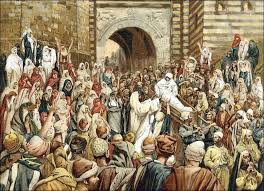
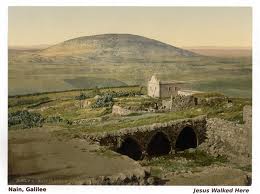
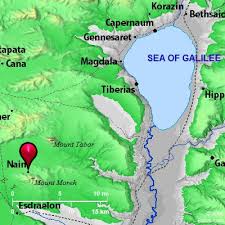 Luke 7:11 Soon afterward he went to a town called Nain, and his disciples and a great crowd went with him.
Luke 7:11 Soon afterward he went to a town called Nain, and his disciples and a great crowd went with him.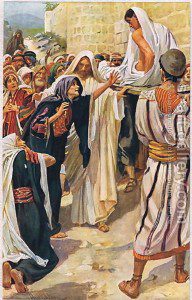 And he said, “Young man, I say to you,arise.” 15 And the dead man sat up and began to speak, and Jesus gave him to his mother.
And he said, “Young man, I say to you,arise.” 15 And the dead man sat up and began to speak, and Jesus gave him to his mother.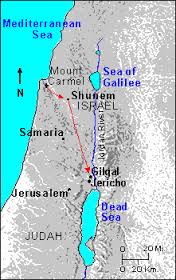 8 One day Elisha went on to Shunem, where a wealthy woman lived, who urged him to eat some food. So whenever he passed that way, he would turn in there to eat food.
8 One day Elisha went on to Shunem, where a wealthy woman lived, who urged him to eat some food. So whenever he passed that way, he would turn in there to eat food.